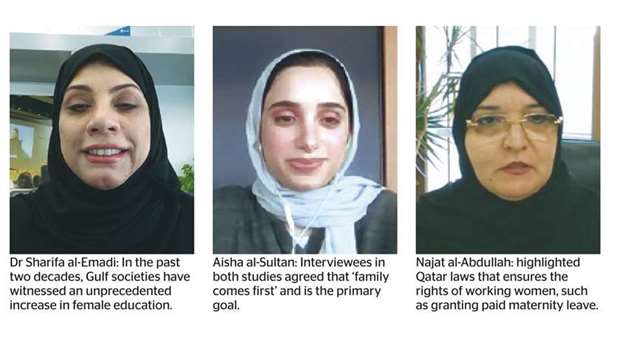Local and regional social experts have revealed the greatest work-family balance challenges in Qatari and Omani societies, and explored how laws and legislation can be updated so that this balance can be struck in both countries, in a virtual discussion organised recently by Doha International Family Institute (Difi).
The Qatar Foundation member’s webinar, Work-family balance in Oman and Qatar: Challenges and Experiences, shed light on the similarities and differences between the countries, based on two comparative studies conducted by the policy and advocacy institute.
The studies aimed to monitor the challenges faced by working parents – especially with regard to working mothers – and their significant impact on family cohesion.
They also looked at the policies in place to help achieve this balance within the labour laws of the two countries, in a way that serves the interests of both families and businesses.
Speaking at the webinar, Difi executive director Dr Sharifa al-Emadi spoke about the context of the studies and the importance of discussing ways to find a work-family balance, saying: “In the past two decades, Gulf societies have witnessed an unprecedented increase in female education, which in turn reflects on the expansion of the contribution Qatari women make to the labour market.”
“As Difi aims to stimulate and support advocacy efforts, the studies focused on what working parents in the region may suffer from, due to a lack of policies which co-ordinate work and family with regard to vacations, childcare arrangements, parental care, and work requirements,” she said. “They also highlighted the mental health issues that may occur in the absence of a balance.”
Difi researcher Aisha al-Sultan outlined some of the findings of the studies in both a Qatari and Omani context, saying: “In general, the results were very similar with regard to the challenges that Qataris and Omanis face in achieving a balance between work and family, due to their similar social backgrounds, the high rate of women’s education in light of the economic turnaround following the discovery of oil in the Gulf region, and the remarkable participation of women in the workforce over the past few years.”
“Interviewees in both studies agreed that ‘family comes first’ and is the primary goal, while work is the means of supporting this goal and securing and providing for a family,” she said. “They also expressed their view that it becomes increasingly difficult to achieve a balance between the two roles and to keep up with highly demanding life requirements and responsibilities.”
“The interviewees in both countries agreed that they primarily depend on negotiating the expectations and responsibilities assigned to each of the role partners, including the spouse, the employer, extended family members, and house helpers, and adjusting family roles to fit within the contexts imposed by a lifestyle and its requirements,” al-Sultan said. “Men and women interviewed in both countries also emphasised that women working has become a necessity for meeting family requirements, and that this is no longer secondary or just an additional source of income for the family.”
Emphasising the importance of understanding and addressing the sensitivities of this issue, Dr Yahya bin Badr bin Malik al-Ma’awali, the governor of Oman’s South A’Sharqiya, told the webinar: “Policies that enable co-ordination between work and family are certainly required.”
“We also need to have thoughtful and flexible legislation which can be regularly adjusted to accommodate and keep pace with the changes that happen at a state level,” he said. “Additionally, all parties – from working parents to business institutions and state legislators – must be aware that life roles are based on contractual foundations and participatory and consensual work.”
“And they must understand how the co-ordination efforts, the recognition of family responsibilities, and the flexibility towards them, will not only benefit working parents, but will also reflect on the business side in terms of employees productivity, helping to ensure a balanced outcome for society as a whole,” he added,
Panelist Dr Saleh al-Ghadoury, the director of the Social Affairs Department at the GCC Executive Bureau, said: “Women have become an active element in the labour market and a major contributor to productivity and economic support, and the success of working women has solved many problems – it has even saved entire families.”
“There are some recommendations that may contribute to addressing the issue of work-family balance, such as allocating daycare facilities close to business centres to accommodate the childcare aspect for working mothers,” he said. “Also, dedicated awareness programmes for young people who are planning on marriage can educate them about marriage responsibilities and the principles of building a family, supporting equality between men and women in raising children and working.”
Najat al-Abdullah, the director of Family Affairs at the Ministry of Administrative Development, Labour and Social Affairs in Qatar, said that the development of policies and mechanisms to enhance the strength of the family unit is an ongoing approach.
She highlighted Qatari legislation that ensures the rights of working women, such as granting paid maternity leave for a period of two months (three months in the case of twins), the option of adding annual leave to maternity leave, the right to have a two-hour period for breastfeeding for a period of two years, and allowing working women fully-paid leave for a period of five years to take care of a child with disabilities or who suffers from a medical conditions that require their mother to accompany them.

..
